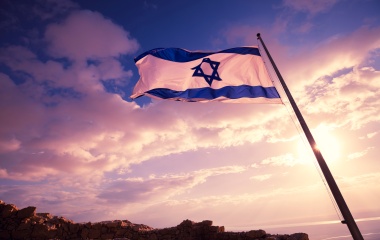
“In every generation one must see himself as if he had left Egypt.” Pesach may seem like a distant memory despite it having concluded less than two weeks ago. Yet it is the legacy of Pesach that hovers so strongly in the 21st century.
Pesach celebrates Jewish peoplehood and nationhood. Such did not come easily and was preceded by much pain and suffering - anti-Jewish laws, increased taxation, forced labour, culminating with Jewish babies being thrown into the Nile.
While the above describes the events of some 3,300 years ago they could easily be describing events of the 20th century. I write these words from Israel on the eve of Yom Haatzmaut, in many ways the most joyous day of year. It is a day no less and perhaps more miraculous than the original Yom Haatzmaut celebrated in Egypt long ago. The modern day Yom Haatzmaut is preceded by Yom HaZikaron, a day no less sad than those in Egypt prior to the exodus as we remember the 23,447 casualties of war and terrorism. This roller coaster of emotions is reflective of Jewish history with its great tragedies and great moments of triumph. It is in Israel where tomorrow’s Jewish history is being made today. It is only here that Judaism is more than a religion - it is a way of life for a re-born nation.
The number 68 has little intrinsic significance. To the best of my knowledge it does not appear in Tanach nor in rabbinic literature. Nonetheless perhaps we can find some meaning in the Gematria, the numerical equivalent of 68 sach, which means to discuss, to talk about. One of the first places the Jews arrived after leaving Egypt was Pi hacheerot, which literally translates as the mouth of freedom. A slave is voiceless - both because there is no one to speak on his behalf and even more tragically because they themselves are often numbed into silence, losing their ability or even desire to speak. Freedom is marked by the ability to speak and it is for good reason we in democratic countries so value freedom of speech.
Yom Hazikaron is marked by utter and complete silence both in the evening and then again in the morning as the country comes to a standstill in moments of silence.
Yom Haatzmaut is marked by the sounds of Jewish life pulsating in Israel. And what sounds there are. Sounds from the four corners of the earth, in so many languages and with such diversity.
The importance of talking about Israel can be seen in a passage we recently came across in daf yomi. The Gemara (Kiddushin 49b) relates how someone sold his possessions as he planned to move to Israel. As it turned out he ended up not moving and wanted to void the sale. Unfortunately for him he did not articulate his intention upon making the sale and thus Rava ruled that the sale cannot be nullified. Had he just spoken about living in Israel he would have saved himself a lot of money. In a related case where the person did specify that he was selling his assets because he wanted to move to Israel Rava allowed the sale to be voided even though the person did actually move to Israel. However his aliyah was unsuccessful - Rashi explains he could not find an appropriate home or a means of support -
and when he returned to Bavel Rava allowed him to cancel the sale. His intent was not just to move but to have a successful aliyah.
If one reverses the samech and the chet, instead of sach, one gets chas, which means to have mercy - as in the expression “The Holy one Blessed be He chasa, has mercy on the money of Israel[1].” We today have a State of Israel only because G-d has mercy on His people. When asked why our generation merited Israel, Rav Solovetichik responded because we needed it. Other generations were quite capable of surviving in the Diaspora without a State. We are not. One shudders to think what the rate of assimilation would be today if not for the State of Israel. And as we have often noted, in the years preceding the establishment of the State masses of Jews left religion behind as they embraced modernity. Baa’alei teshuva could be counted on one hand or less. The State of Israel changed all that. In addition to its great support of Torah it has allowed hundreds of thousands of Jews to retain a connection to Torah and the Jewish people even as they abandoned mitzva observance[2].
And especially so soon after the Holocaust we are most cognizant of the physical safety Israel provides. While peace is still a distant dream for the first time in 2,000 years Jews can and do protect themselves. Here too it is scary to think what the safety of the Jew would be around the world if not for the State of Israel.
As we celebrate the 68th year of the modern State of Israel we must sach, talk about Israel both for our own sake and for the sake of influencing others, if ever so slightly. And may G-d chas, have mercy on His people so that we may witness the geula shleima, the complete redemption speedily in our day.
[1] It is for this reason that concern for loss of money is often an important factor in rendering legal rulings. For example we may rule that food that has a questionable status may and should be eaten by a poor person whereas that same food may not be eaten by someone of means. While the level of kashurt has not changed questions of Jewish law must be answered taking the needs of the questioner into account.
[2] I owe this insight to Rabbi Moshe Taragin.



